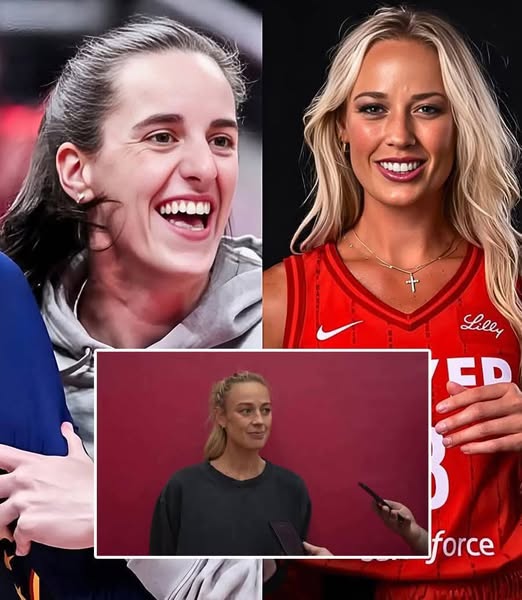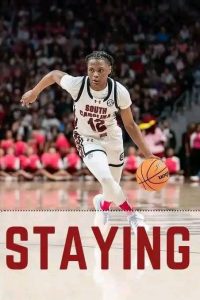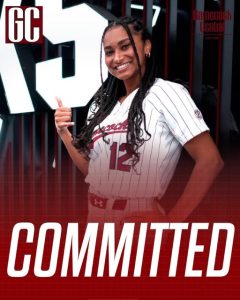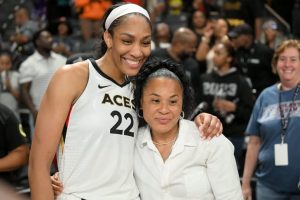“Sophie Cunningham Breaks Silence: ‘Had to Wreck a Chick’ to Protect Caitlin Clark After Years of WNBA Neglect”

Sophie Cunningham has never been one to back down from a challenge, and her latest comments regarding the treatment of Caitlin Clark in the WNBA have ignited a firestorm of conversation. After a physical on-court altercation that left fans and analysts buzzing, Cunningham didn’t hold back, explaining her mindset in raw, unfiltered terms. “Had to wreck a chick,” she said, addressing the moment that many saw as the tipping point in a growing narrative: that Clark, the WNBA’s newest megastar, has not been adequately protected by league officials.
In a league filled with veterans and rising stars, the arrival of Caitlin Clark has been both a blessing and a burden. Her talent is undeniable. Her impact on ticket sales, TV ratings, and national visibility has been seismic. But the increased spotlight has come with added pressure — and, according to Cunningham and many others, with insufficient support from referees and the league as a whole.
Cunningham’s statement wasn’t just a viral soundbite — it was a boiling-over of frustration, loyalty, and a deeper sense of duty. Speaking after the game, she elaborated: “Oh, you know what? I’m just going to be me. I don’t go in there trying to predetermine anything. You know, I’m dialed in; I need to focus on hitting my shots, making sure I’m executing the schemes right. I’m not focused on the extracurricular activities. And you know what? During that, it was just part of the game. I think the refs had a lot to do with that. It was a buildup for a couple of years now of them just not protecting, you know, the star player of the WNBA. And so, at the end of the day, I’m going to protect my teammates. That’s what I do, and I’m a team player.”
Her words reverberated far beyond the post-game interview. Social media platforms exploded with praise, criticism, and passionate debate. Cunningham, known for her grit and edge, became a lightning rod for the ongoing discussion about how the WNBA handles physicality and the protection of its most marketable players. Some applauded her candor and team-first mentality. Others questioned the league’s discipline policies and the broader implications for player safety.
But to truly understand the weight of Cunningham’s statement, one must look at the context in which it was made. Caitlin Clark has been the subject of relentless physicality since her transition from college to the pros. While contact and toughness are hallmarks of elite competition, many believe that Clark — as the league’s most recognizable rookie in years — has been targeted with excessive aggression. The league’s officials, in the eyes of Cunningham and others, have too often turned a blind eye.
Clark, for her part, has remained composed. She hasn’t openly criticized officials or opponents, choosing instead to focus on her performance and her team. But the hits keep coming, both literal and figurative. And when someone like Cunningham — who has been in the trenches and knows what it takes to survive in this league — decides enough is enough, the statement isn’t just personal. It’s political.
Cunningham didn’t just react to a moment. She reacted to years of simmering tension, not just surrounding Clark but around the treatment of star players in general. The WNBA has made strides in recent years — increased media coverage, higher salaries, improved facilities — but questions about officiating consistency and player safety remain front and center. Cunningham’s comments cut straight to that heart of that issue.
What makes her words even more potent is their dual nature. On one hand, they were a fierce declaration of loyalty. She went to battle for her teammate, knowing full well it could cost her fines, reputation points, or worse. On the other hand, it was a scathing critique of the league itself — a league she has fought for and helped build — for failing to protect one of its most valuable assets.
The phrase “had to wreck a chick” may sound harsh, but it was never about malice. It was about message. And Cunningham, through her play and her words, delivered it loud and clear. If the league won’t protect its players, then teammates will. If the refs won’t blow the whistle, then players will take matters into their own hands. It’s not the ideal scenario, but in Cunningham’s eyes, it was a necessary one.
This moment also shines a spotlight on the evolving culture of the WNBA. The league is experiencing unprecedented growth — sold-out arenas, massive social media engagement, and a new generation of fans. With that growth comes increased scrutiny, and Cunningham’s comments underscore how much further the league has to go in addressing internal concerns. Protecting players isn’t just about safety — it’s about preserving the integrity of the game, the health of its athletes, and the investment fans are making in the product on the floor.
Caitlin Clark, as the face of that movement, is both symbol and reality. She is the bridge between the league’s past and its future. Her presence demands more from everyone — teammates, coaches, refs, and executives. Cunningham knows that. She feels it. And in her own way, she’s demanding the league step up.
For the fans who have followed Cunningham’s career, this moment is no surprise. She’s never been one to shy away from conflict or tough conversations. She brings fire and edge, but she also brings leadership. Her actions, whether dropping threes or standing up for a teammate, speak volumes. And when she finally spoke on this latest controversy, it wasn’t about seeking headlines — it was about drawing a line in the sand.
The reaction has been swift. Teammates have backed her. Analysts have dissected every word. League officials, while declining to comment directly, are undoubtedly aware that the temperature has been turned up. The league’s stars are watching. The fans are watching. And now, the pressure is on the WNBA to respond.
Whether that response comes in the form of improved officiating, clearer communication with players, or revised policies around physical play, something has to give. Because Cunningham’s comments, as bold as they were, represent a deeper truth. The WNBA is at a crossroads — between celebrating its meteoric rise and ensuring the infrastructure is in place to sustain it.
And at the center of that crossroads stands Caitlin Clark, with a target on her back and a spotlight on her every move. She doesn’t need bodyguards. She doesn’t ask for special treatment. But she — and players like her — deserve respect and protection. Not just because of who she is, but because of what she represents.
Sophie Cunningham reminded everyone of that truth. And whether or not you agree with how she chose to deliver that message, you can’t deny the impact. In one sentence, she flipped the narrative and forced a long-overdue conversation. “Had to wreck a chick” wasn’t just about one play or one player. It was about a league growing up — and the players demanding that it do better, faster.
The road ahead for the WNBA is filled with promise, but also with challenges. The stars are bigger. The lights are brighter. The stakes are higher. And now, thanks to Cunningham, the expectations are too. She didn’t just speak for herself. She spoke for teammates. For fans. For the future. And if that means catching heat, so be it.
Sophie Cunningham is built for it. Just like the league she’s fighting to improve.





